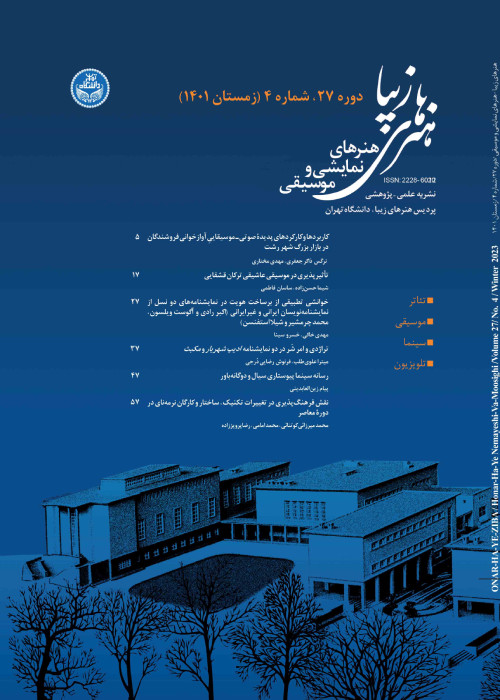Continuity and Discontinuity of cultural in before constitution theater of Iran. Study of " Zaman Khan's Rule" written by Mirza Agha Tabrizi
Author(s):
Abstract:
In cultural semiotics as posed by Tartu-Moscow circle the concepts of cultural sphere, border, and the (non)cultural other and the dialogue between this cultural self and that other on the borders are very critical. The mechanism of intercultural translation and the processes of inclusion and exclusion govern this intercultural dialogue. Such communication between cultures, in order to be realized, should be based on some similarities and differences. The presumed borders are not definite separating lines; rather there are some overlapping areas between two cultures. These are the areas which create continuity on the continuum of cultures. At the same time since the cultures want to create cultural identity through differences, gradually moving back from these margins towards the center (of culture), they experience a discontinuity. This dialectic of continuity and discontinuity generates the propelling energy and dynamicity of culture. In cultural semiotics, culture is not a self-contained, autonomous sphere, rather it is synchronically and diachronically a dynamic process of intercultural, inter-textual and intersemiotic relations, unstable, always in change and dynamic. Theater, in its contemporary sense, is a sub-sphere of culture developed through such intercultural translation and processes of inclusion and exclusion. This study tries to study the Iranian contemporary theater in the light of a cultural semiotic theory. We want to see how modern western theater found its way to Iranian cultural sphere, and was gradually appropriated, and found its local features. The collected data are classified thematically and then analyzed and finally we will have a case study which is the drama “Zaman Khan’s Rule” written by Mirza Agha Tabrizi who is known as the first Iranian playwright. The important figures studied in this article are Mirza Fathali Akhundzadeh and Mirza Agha Tabrizi which had a critical role in intruding theater to Iranian culture. These two people were contemporary to each other but because of living in different cultural contexts had different approaches to theater. In fact it was Mirza Fathali Akhundzadeh who was the source of inspiration for Mirza Agha Tabrizi and the interesting point is that Akhundzadeh himself lived in Tbilisi who was in fact a border and threshold between Iranian cultural sphere and western culture. As a matter of fact, Tbilisi’s theater was itself a result of intercultural relations with west. Thus Akhunzadeh himself, living for a long time in Tbilisi, looked at western theater as something belonging to a cultural other. Therefore Mirza Agha Tabrizi was experiencing a double intercultural translation. In this article we have tried to show the complicated double mechanisms of inclusion and exclusion and its effects on Iranian theater. It is evident that in this article we do not consider culture and as a result theater a product but a complex, multifaceted process, Theater entering Iran began a dialogue with local traditional plays and modern Iranian theater, like any other cultural process, is the result of such dialogues, between local forms and those coming from the other. Indeed this is in pace with all other aspects of our contemporary life.
Keywords:
Language:
Persian
Published:
Honar-Ha-Ye-Ziba: Honar-Ha-Ye Mosighi Va Namayeshi, Volume:20 Issue: 51, 2015
Pages:
27 to 40
magiran.com/p1468445
دانلود و مطالعه متن این مقاله با یکی از روشهای زیر امکان پذیر است:
اشتراک شخصی
با عضویت و پرداخت آنلاین حق اشتراک یکساله به مبلغ 1,390,000ريال میتوانید 70 عنوان مطلب دانلود کنید!
اشتراک سازمانی
به کتابخانه دانشگاه یا محل کار خود پیشنهاد کنید تا اشتراک سازمانی این پایگاه را برای دسترسی نامحدود همه کاربران به متن مطالب تهیه نمایند!
توجه!
- حق عضویت دریافتی صرف حمایت از نشریات عضو و نگهداری، تکمیل و توسعه مگیران میشود.
- پرداخت حق اشتراک و دانلود مقالات اجازه بازنشر آن در سایر رسانههای چاپی و دیجیتال را به کاربر نمیدهد.
دسترسی سراسری کاربران دانشگاه پیام نور!
اعضای هیئت علمی و دانشجویان دانشگاه پیام نور در سراسر کشور، در صورت ثبت نام با ایمیل دانشگاهی، تا پایان فروردین ماه 1403 به مقالات سایت دسترسی خواهند داشت!
In order to view content subscription is required
Personal subscription
Subscribe magiran.com for 70 € euros via PayPal and download 70 articles during a year.
Organization subscription
Please contact us to subscribe your university or library for unlimited access!


